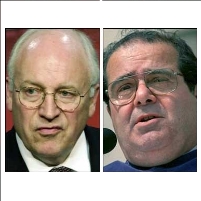When to Recuse—The Sotomayor Standard vs. The Scalia Standard
Friday, July 03, 2009
 Not in the same duck blind
Not in the same duck blind
Critics of Sonia Sotomayor can knock her for her liberal views or rulings regarding affirmative action, but if there’s one thing the U.S. Supreme Court nominee can’t be criticized for it is her willingness to recuse herself. Based on her long record as a judge, Sotomayor has shown herself to be extremely cautious when deciding to withdraw from cases for which her impartiality might be compromised.
According to The New York Times, Sotomayor has recused herself at least 141 times since becoming a judge in 1992. Her reasons have ranged from being friends with an attorney involved in a case to having represented a party while she herself was a lawyer. One particular case, however, demonstrates the lengths to which Sotomayor will go to avoid being accused of being partial. In 1997 she recused herself from presiding over a lawsuit involving a plaintiff who was diabetic—simply because Sotomayor herself has Type 1 diabetes.
Steven Lubet, a legal ethics professor at Northwestern University, said it is unheard of for judges to recuse themselves just because they share the same medical condition as a party in a legal matter. “Under no circumstances, by any stretch of the imagination, would that alone require disqualification,” Lubet told The New York Times.
If Sotomayor is confirmed and joins the high court, she will work alongside Justice Antonin Scalia, who has demonstrated quite a different standard on recusing himself. Back in 2004, the conservative jurist refused to disqualify himself from a lawsuit brought by environmentalist groups against Vice President Dick Cheney over the secret meetings he held with energy executives at the beginning of President George W. Bush’s first term in office. A motion for Scalia to recuse himself was made by the plaintiffs because of the judge’s long friendship with Cheney.
Indeed, while the case was being considered by the Supreme Court, Scalia went on a duck hunting vacation with Cheney on the Louisiana estate of Wallace Carline, the president of a company that provided services and equipment rental to oil rigs. Scalia flew down on Cheney’s airplane and they spent three days together, along with several other hunters. Scalia argued that there was no conflict of interest in the case because he and Cheney never hunted in the same blind, and they never discussed the case against Cheney. On this basis, Scalia refused to recuse himself.
“For Pete’s sake, if you can’t trust your Supreme Court justice more than that, get a life,” Scalia told an audience at the University of Connecticut law school when he was asked about the Cheney case. “I think the proudest thing I have done on the bench is not allowed myself to be chased off that case.”
Cheney won the Supreme Court case on a 7-2 vote.
-Noel Brinkerhoff
Sotomayor’s Recusals Suggest Impartiality (by Benjamin Weiser, New York Times)
Scalia Says He's Proud He Didn't Recuse Himself in Cheney Case (by Stephanie Reitz, Associated Press)
Duck-Blind Justice: Justice Scalia's Memorandum in the Cheney Case (by Monroe Freedman, Georgetown Journal of Legal Ethics)
- Top Stories
- Unusual News
- Where is the Money Going?
- Controversies
- U.S. and the World
- Appointments and Resignations
- Latest News
- Musk and Trump Fire Members of Congress
- Trump Calls for Violent Street Demonstrations Against Himself
- Trump Changes Name of Republican Party
- The 2024 Election By the Numbers
- Bashar al-Assad—The Fall of a Rabid AntiSemite






Comments